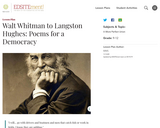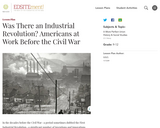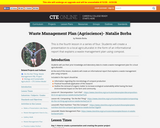
Students will investigate how connections are made across Earth, focusing on advancements in transportation and technology.
- Subject:
- Social Science
- Material Type:
- Lesson
- Provider:
- Michigan Virtual
- Author:
- GRACE Project
- Date Added:
- 12/27/2016

Students will investigate how connections are made across Earth, focusing on advancements in transportation and technology.

In 1960, as President Eisenhower’s second term was drawing to a close, the mood of American voters reflected one of restlessness. Between the U.S. economy experiencing a recession and recent Cold War achievements by the Soviets including the successful launch of Sputnik 1 in 1957 and the development of long range missiles, Americans were feeling vulnerable. Along with U.S. foreign powers setbacks in 1960 (the U-2 incident and the alignment of Cuba with the Soviet Union) many Americans were beginning to question whether the U.S. might be losing the Cold War. Therefore, as two very different personalities campaigned for the Presidency, the role of the media took center

During the end of the 1800s, society had changed dramatically as a result of the Industrial Revolution. Cities had grown and the demographics of the American population had become increasingly diverse. Although the economic gains were substantial, this came at a significant social cost. The nation began to struggle with issues of unemployment, dangerous working conditions, and political corruption. Although private citizens had long been making attempts to reform these issues, many began to feel that an increased role of government would be necessary to effectively address the nation’s problems.

Have you ever wondered about the first people who lived on our continent? How did they get here? It is believed by many historians that thousands of years ago, hunters following herds of animals like woolly mammoths and bison migrated (or moved) to the Americas on foot from Asia. This belief assumes that they crossed over a frozen land bridge caused by the Ice Age.

America’s involvement in WWI left most Americans exhausted--in more ways than one. Soldiers returning home had suffered huge emotional distress from the war itself as well as from the physical injuries that many had suffered. Americans at home were deeply divided over the issues at the forefront of the League of Nations debate and the impact that the war had on thousands of immigrants with relatives overseas, many suffering in war-torn lands. Many Americans wished to return to what President Harding described as “normalcy.” Because of this desire by the American public, three trends in American society began to develop, both in rural towns and in urban areas across the country

In the 1700s England fought several wars with France over control of Europe. Conflicts over land ownership caused the hostilities between these two dominant countries to spread to North America. In 1754 the French and Indian War began. It got its name from the people that the British colonists and their American Indian allies were fighting – the French and their American Indian allies. The French and Indian war lasted from 1754 to 1763. It was also called the Seven Years War.

Even though the 1920s were “roaring” in many respects, from an economic standpoint it became clear that serious problems threatened the nation’s economy. Important industries were in trouble and overproduction plagued the agricultural sector. As the decade came to a close, the slipping economy would soon crash, thus ending a decade of innovation, cultural advances, and individual prosperity.

The Declaration of Independence was just the beginning. The colonists kept this document in mind as they fought for independence and created their own government. This Declaration has inspired, and continues to inspire, the promise of freedom around the world.

After four long and bitter years of a disastrous conflict that claimed the lives of over 620,000 soldiers, a haggard and worn president looked over the crowd and uttered the immortal words: “With malice toward none, with charity for all, with firmness in the right as God gives us to see the right, let us strive on to finish the work we are in, to bind up the nation’s wounds, to care for him who shall have borne the battle and for his widow and his orphan, to do all which may achieve and cherish a just and lasting peace among ourselves and with all nations.

As Soviet and U.S. soldiers worked together to liberate Germany at the end of World War II in Europe, many on both sides hoped for continued friendship between the two countries. However, problems had been building between the two nations both before and during the war. Combined with the incompatibility of the economic and political systems that drove both countries, significant foreign policy clashes were imminent.

The Cold War had a significant impact on domestic life in the decade after the WWII; however, for most Americans, economic prosperity and social aspects such as pop culture and the building of suburban lifestyles by the middle class dominated thoughts of anti-Communist fear. Even though the 1950s were known as a time of unprecedented prosperity, not every subgroup of American society benefitted. The urban poor, Mexican Americans, and Native Americans were left untouched by the economic boom, living in poverty.

Explore urban areas around the world, including their layout, size, and other factors.
GeoInquiries are designed to be fast and easy-to-use instructional resources that incorporate advanced web mapping technology. Each 15-minute activity in a collection is intended to be presented by the instructor from a single computer/projector classroom arrangement. No installation, fees, or logins are necessary to use these materials and software.

ViSH is a social and collaborative site for creating and sharing knowledge resources for the realization of educational activities. It provides a collection of tools and services for facilitating the creation of high quality courseware and maximizing technology enhanced learning both in the classroom and in Virtual Learning Environments and Learning Management Systems. ViSH is also a community for teachers and educational professionals who want to meet new educators, create, share and discover novel educational resources, and get access to tools for maximizing technology enhanced learning.

In this lesson, students explore the historical context of Walt Whitman's concept of "democratic poetry" by reading his poetry and prose and by examining daguerreotypes taken circa 1850. Next, students will compare the poetic concepts and techniques behind Whitman's "I Hear America Singing" and Langston Hughes' "Let America Be America Again," and have an opportunity to apply similar concepts and techniques in creating a poem from their own experience.

In this lesson, students explore the First Industrial Revolution in early nineteenth-century America. By reading and comparing first-hand accounts of the lives of workers before the Civil War, students prepare for a series of guided role-playing activities designed to help them make an informed judgment as to whether the changes that took place in manufacturing and distribution during this period are best described as a 'revolution' or as a steady evolution over time.

This is the fourth lesson in a series of four. Students will create a presentation to a local agriculturalist in the form of an informational report that explains a waste management plan using compost.

Students will analyze how the market areas for specific chain stores change based on the type of store.
GeoInquiries are designed to be fast and easy-to-use instructional resources that incorporate advanced web mapping technology. Each 15-minute activity in a collection is intended to be presented by the instructor from a single computer/projector classroom arrangement. No installation, fees, or logins are necessary to use these materials and software.

Lonnie Johnson tried to create a new cooling system for refrigerators and air conditioners, but instead created the mechanics for one of the top twenty toys of all time, the Super Soaker. From childhood to adulthood, Lonnie had a love for rockets, robots, inventions, and a mind for creativity. He was driven toward innovation through his persistence and passion for problem solving, tinkering, and building. These traits served him well as we went on to work for NASA as an engineer. The resource includes a lesson plan/book card, a design challenge, and copy of a design thinking journal that provide guidance on using the book to inspire students' curiosity for design thinking. Maker Challenge: Students will use materials on hand to invent and design a new toy or game.
A document is included in the resources folder that lists the complete standards-alignment for this book activity.

Emma Lilian Todd was a self-taught engineer who tackled one of the greatest challenges of the early 1900s: designing an airplane. As an adult, typing up patents at the U.S. Patent Office, Lilian built inventions in her mind, including many designs for flying machines. However, they all seemed too impractical. Lilian knew she could design one that worked. She took inspiration from both nature and her many failures, driving herself to perfect the design that would eventually successfully fly. The resource includes a lesson plan/book card, a design challenge, and copy of a design thinking journal that provide guidance on using the book to inspire students' curiosity for design thinking. Maker Challenge: Design a new mode of transportation (air, sea, or ground) or select a current mode of transportation and improve it then use household items to create a prototype of your new or updated invention.
A document is included in the resources folder that lists the complete standards-alignment for this book activity.

During the thirteenth century, the Mongols built an empire from scratch through remarkable feats of organization, planning, endurance, courage, slaughter, destruction, and terror. The empire was ruled by a combination of exploitation and protection of those conquered. The Mongol peace-keeping and encouragement of long distance communications, resulted in the widespread exchange of ideas, goods, and techniques, as well as in the spread of disease.